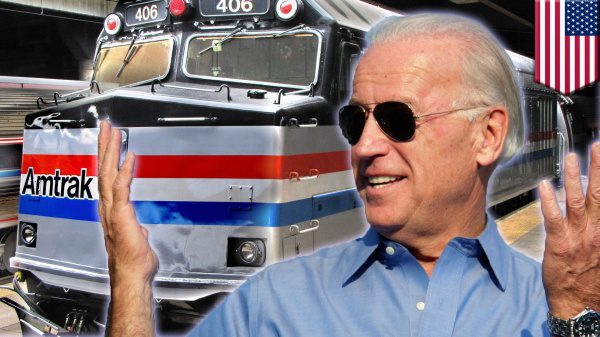
Remember when Joe Biden bragged he negotiated a deal with the rail unions?
In September Biden said the deals were “a win for tens of thousands of rail workers and for their dignity and the dignity of their work.”
WATCH:
CBS' @ScottPelley doing journalism: "Mr. President, you have just averted a nationwide railroad strike that would have been crippling to the economy. How did you do that? And what were those last hours like in negotiations?" pic.twitter.com/fqdLhaO1US
— Tom Elliott (@tomselliott) September 16, 2022
Biden’s Labor Secretary Marty Walsh helped negotiate a 24% pay increase over a period of 5 years to union workers.
The Biden Regime also helped negotiated ‘better working conditions’ and ‘caps on what they have to pay out of pocket for healthcare’ – AP reported.
Well those negotiations fell apart on Monday.
CNN reported:
America faces a growing risk of a crippling national freight rail strike in two weeks after rank-and-file members of the nation’s largest rail union, which represents the industry’s conductors, rejected a tentative labor deal with freight railroads, the union announced Monday.
The nation’s second-largest rail union, which represents engineers, ratified its own contract. But the failure of the conductors to ratify their own deal is another setback to efforts to avoid a crippling nationwide rail strike.
The two unions are the transportation division of the Sheet Metal, Air, Rail, Transportation union (SMART-TD), which represents about 28,000 conductors and the Brotherhood of Locomotive Engineers and Trainmen (BLET), which represents about 24,000 engineers. The engineers and conductors make up the two-person train crews. Both unions reached tentative deals in September in a marathon 20-hour negotiating session just hours before their earlier strike deadlines.
The deals nearly got the support they needed to be ratified by both unions. It was ratified by the engineers, with 53.5% voting yes, while an apparent majority of the conductors also voted for ratification.
But the conductors’ vote ultimately failed because the union’s rules require each of five classes of workers within the union to approve the deal for it to pass. Although 64.5% of members who ride the locomotives with the engineers supported the deal, 50.87% members of train and engine service members of the union voted against ratification. Those members did not get the same improvement in contract language that other members of SMART-TD won in the final negotiations, and that apparently led to the deal’s failure.
If the unions are unable to reach new deals before the December 9 strike deadlines, Congress could order the railroad workers to remain on the job or return to work. – CNN reported.
DEVELOPING…
